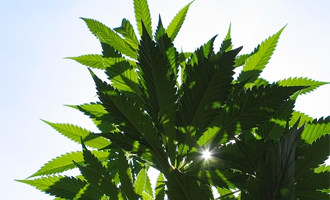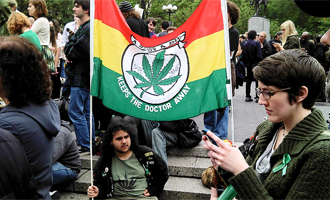Across the United States, tens of millions of residents have been arrested for violating marijuana laws. Arrests for offenses related to marijuana have increased dramatically since 1992. In 2010 alone, there were 853,838 arrests. Remarkably, more than half of all drug-related arrests that year involved marijuana alone. And almost nine of every ten people apprehended for marijuana offenses are charged with mere possession, not sales or distribution.
America’s efforts to reduce marijuana use over the past four decades have largely depended on arrest, imprisonment, incarceration—and, recently, the seizure of private property through asset forfeiture laws. The aim of such heavy legal firepower is to deter potential consumers, reduce marijuana use, limit availability, and increase the price of the drug. But existing research suggests that these goals have not been achieved. Instead, prices have declined and increasingly potent marijuana has become more readily available to growing numbers of users—even as arrests have climbed. Developments are not the same in all states and localities, but overall there is no clear indication that intensified enforcement decreases marijuana use.
Marijuana Prohibition is Costly for Society, Families and Individuals
Enforcement efforts against marijuana use may not work well, but they are still costly to the public as well as to the individuals and families involved.
- The savings that would follow from decriminalizing marijuana use are hard to calculate, but it is clear that the enforcement of marijuana laws consumes significant fiscal and organizational resources that could be allocated toward other public safety goals, or toward the provision of much-needed social services.
- The fiscal costs of marijuana enforcement are only partially offset by legal seizures of assets from convicted dealers. But the very possibility of asset forfeiture creates perverse incentives for police agencies and may reduce public safety.
- The enforcement of laws against simple use of marijuana creates additional pathologies in the criminal justice system—including controversial policing tactics, the erosion of civil liberties, over-crowding in the courts, and the diversion of drug treatment dollars that could better be used to help more troubled offenders. The last problem appears when recreational marijuana smokers are required to participate in mandatory drug treatment programs.
-

Image by Ryan Van Lenning via Flickr People arrested for marijuana use pay heavy costs—and so may their families and associates. Whether or not they are ultimately convicted, those arrested commonly incur lawyers’ fees, fines and other court charges, and many also lose income and valuable assets. For both people apprehended and their families, arrests mean emotional stress and perhaps also the loss of faith in the fairness of the criminal justice process.
- Marijuana prohibition contributes to racial inequalities in the United States, because marijuana arrests are not evenly distributed across the population. Approximately 30% of those arrested for violating marijuana laws are African Americans, who pay the highest costs along with their families and communities.
Penalties and Enforcement Vary
The legal consequences of marijuana violations can be severe. But they are also uneven to the point of capriciousness, because laws and enforcement efforts are highly variable.- A number of U.S. states have passed laws that permit the use of marijuana for medical purposes. Many municipalities have reduced the priority of enforcement. Some states have decriminalized marijuana altogether, while other jurisdictions mandate treatment for non-violent drug offenders rather than tossing them in prison.
- The consequences for people convicted for marijuana offenses are also extremely variable. In states that have decriminalized marijuana, a person found in possession of the drug faces only a civil fine. In sharp contrast, in the state of Louisiana a person convicted the third time for possession of just one ounce of marijuana may be sentenced to twenty years in prison.
Can We Decriminalize Marijuana?
Researchers have used two main strategies to assess the impact of decriminalizing marijuana. One strategy compares patterns of marijuana use in jurisdictions with very different laws or enforcement policies. Another approach tracks shifts within jurisdictions where laws or enforcement practices have clearly changed. Both kinds of studies indicate that legal prohibitions and tough enforcement have little impact on rates of marijuana consumption. People use the drug regardless of whether they may face severe legal consequences.

In November 2012, majorities of citizens in Colorado and the state of Washington voted to make it made it legal to possess and smoke pot recreationally. When the new laws are certified, people 21 years and older will legally be able to possess up to an ounce of marijuana. In Colorado, people will also be able to grow as many as six plants; and in Washington, they will be able to obtain marijuana from state-licensed providers.
But these fledgling state laws conflict with federal drug policy. Marijuana is currently prohibited by the U.S. government, classified as a “Schedule I controlled substance” with high potential for abuse and no safe or accepted medical use.
How will national authorities respond to the new legal directions charted by the voters of Colorado and Washington? The answers will become evident in coming months—and will have a big impact on the ability of all U.S. states to adopt alternative and potentially more socially constructive approaches to the use and regulation of marijuana.

 Research to Improve Policy: The Scholars Strategy Network seeks to improve public policy and strengthen democracy by organizing scholars working in America's colleges and universities. SSN's founding director is Theda Skocpol, Victor S. Thomas Professor of Government and Sociology at Harvard University.
Research to Improve Policy: The Scholars Strategy Network seeks to improve public policy and strengthen democracy by organizing scholars working in America's colleges and universities. SSN's founding director is Theda Skocpol, Victor S. Thomas Professor of Government and Sociology at Harvard University.
Comments 2
Ellen — December 13, 2012
I think this article is really discussing the liberalizing of America, and how change begins. It is a fact that America is always becoming more liberal. We began by freeing slaves, giving women the right to vote, ensuring equality and the right to marry to all races, etc. More recently though, we have given, or are in the process, of giving homosexuals equal rights in areas of jobs, housing, and in some states marriage. We are also legalizing marijuana, on a local and state level. These changes start on an individual level with people and communities becoming more accepting of homosexuals and recreational drug use. Activists work to promote this liberalization by cementing the changes in new laws on a local and state level. Usually this is concurrent with a national movement for change, so national laws are passed around the same time that state laws are passed. However, legalizing marijuana is a very radical step that so far only some of the most liberal states have taken. Since marijuana is still considered a Schedule 1 drug, the new laws could be overturned. However, this trend of liberalization will continue, and eventually, logically, marijuana will be legalized.
The criminalization of marijuana follows the typical path of criminalization where the disenfranchised are the most affected and punished. Drug use is common in schools, and marijuana is usually the drug of choice because of its limited long-term effects and abundance, however most arrested are African-American males, showing that the arrests are not based necessarily on the crime, but on the perceived criminal. As described in Victor Rios's book Punished, minorities are persecuted because they are believed to be guilty, which makes it easier to charge them with crimes and misdemeanors like possession. If we decriminalized possession of marijuana, it would free up resources to pursue more dangerous crimes like murder. Since people could sell and raise marijuana legitimately it would create a new job market, but also take away income from gangs that profit from drug dealing. Decriminalizing marijuana, would create less criminals and allow cops to allocate resources away from petty crimes, to tackle more important issues.
Joe — December 17, 2012
Although nearly every proponent of marijuana legalization seems to use the "it's not addictive and is much less harmful than many other drugs, including alcohol and tobacco" argument, I think therein lies the biggest reason NOT to legalize. I think this article touches on many good arguments against the prohibition of marijuana, but what many don't look at too closely is what would happen after legalization. If (or when) marijuana is made legal on a larger scale than it currently is, it will became a glaring opportunity for profit that corporations will snap right up. I fear that in order to increase that profit, those corporations will increase the potency of the drug or sell it with addictive additives and before we know it marijuana will no longer be such a harmless substance.
I agree with the general content of this article, that the persecution marijuana faces in the U.S. is an inefficient use of resources to fight a drug that is not a serious problem. However, I think that if we go as far as legalizing marijuana (as we have alcohol, etc.) we must proceed with caution, lest it become a more serious problem than it is now.